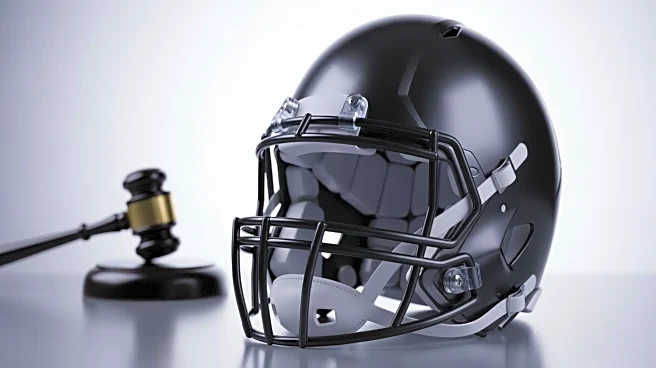What's Happening?
Jamier Brown, a wide receiver commit for Ohio State, has been granted a temporary restraining order by a Franklin County judge against the Ohio High School Athletic Association (OHSAA). The order challenges OHSAA's rules that prevent high school athletes
from profiting from their name, image, and likeness (NIL). Brown, alongside his mother Jasmine, filed the lawsuit in the Franklin County Court of Common Pleas, arguing that the prohibition on NIL deals is unfair to high school athletes in Ohio. Brown, ranked as the No. 1 wide receiver and No. 5 overall prospect in the 2026 class, has an estimated earning potential of over $100,000 annually. He believes that allowing NIL deals could significantly benefit athletes like him by alleviating financial burdens related to training and education.
Why It's Important?
The case highlights the ongoing debate over NIL rights for high school athletes, a contentious issue in several states. Ohio is one of six states that currently prohibit high school athletes from engaging in NIL deals. The temporary restraining order could set a precedent for other athletes seeking similar rights, potentially influencing policy changes in Ohio and beyond. If successful, Brown's lawsuit could expedite the OHSAA's planned vote on NIL rules, originally scheduled for May 2026, and pave the way for high school athletes to capitalize on their personal brands. This development could have significant implications for the future of high school sports, athlete compensation, and the broader NIL landscape.
What's Next?
The OHSAA may need to reconsider its stance on NIL deals for high school athletes, especially in light of the temporary restraining order. The association had previously rejected a rule change on NIL in 2022, but Brown's legal challenge could accelerate discussions and decisions regarding NIL policies. Stakeholders, including athletes, schools, and sports organizations, will likely monitor the case closely, as its outcome could influence similar legal actions in other states. The broader sports community may also engage in discussions about the ethical and economic implications of NIL rights for young athletes.
Beyond the Headlines
The case raises important questions about fairness and equity in high school sports. Allowing NIL deals could help level the playing field for athletes from diverse socioeconomic backgrounds, providing them with opportunities to support their education and athletic development. Additionally, the legal challenge could prompt broader discussions about the role of amateurism in sports and the rights of young athletes to benefit from their talents and hard work.















